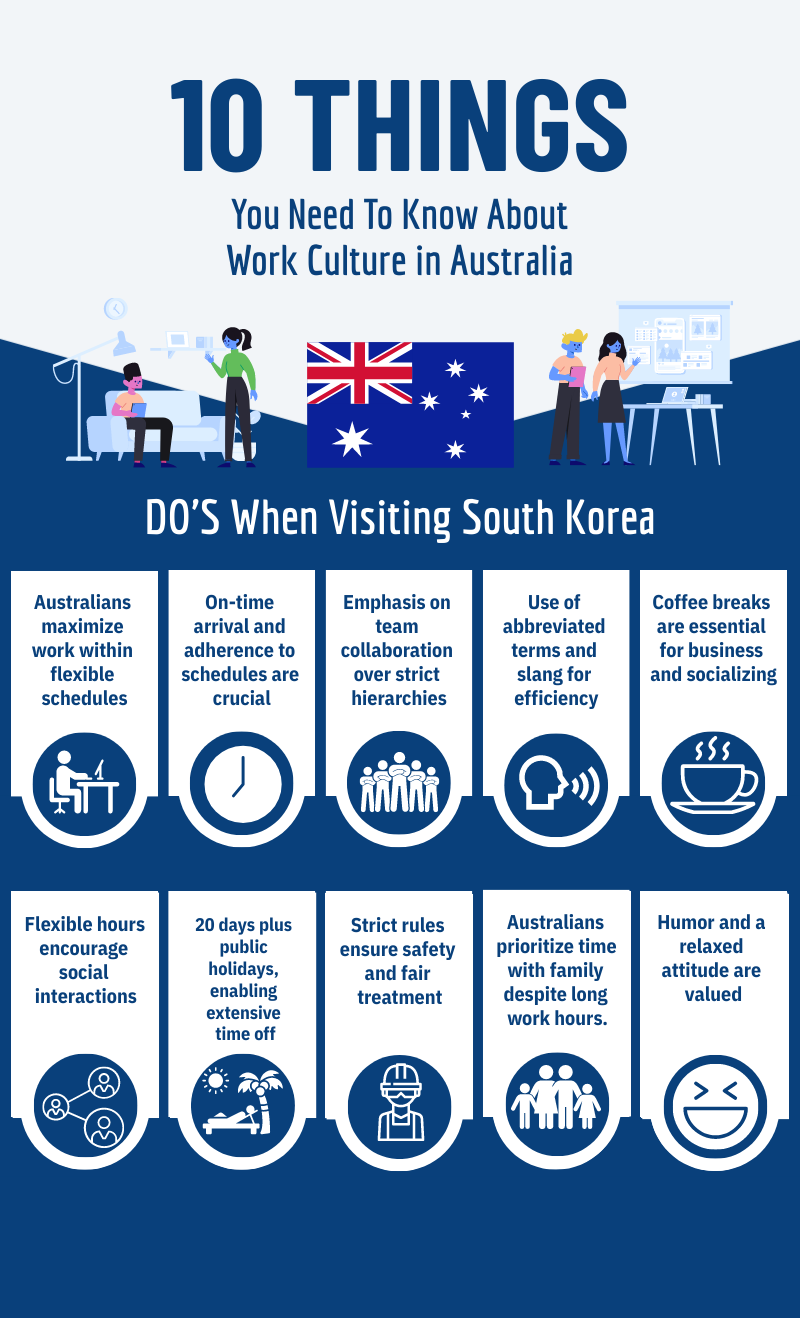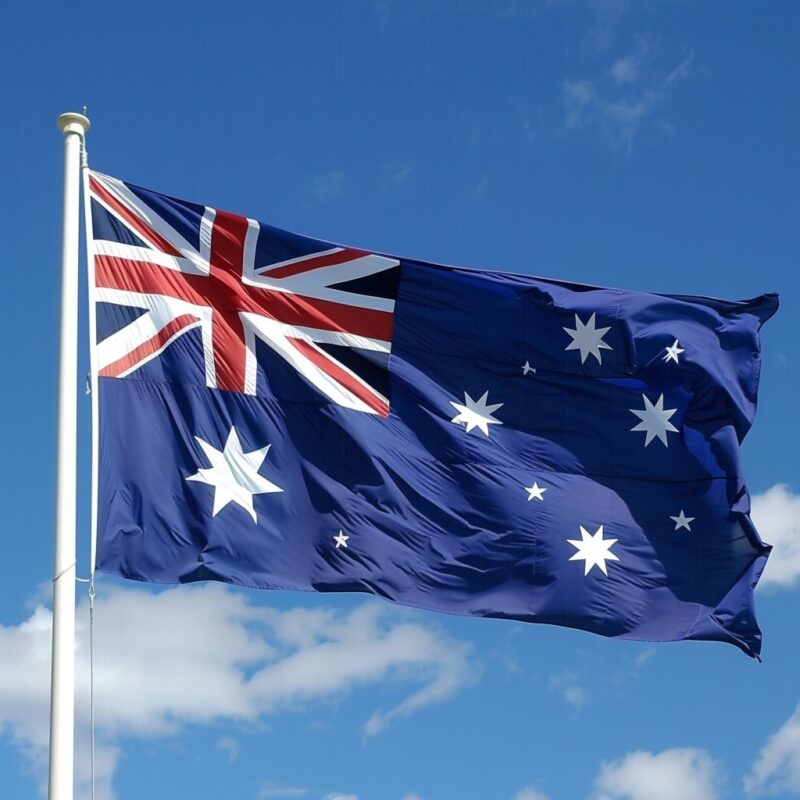So, here’s the deal with workplaces in Australia, mate. When you’re new here, you’ll notice Aussies have this laid-back approach to work, but don’t be fooled—they’re secretly workaholics.
Picture this: you stroll into the office, everyone’s friendly, and there’s a vibe of ‘no worries.’ But when it’s crunch time, they roll up their sleeves and get stuff done.
And let’s not forget the social scene. Aussies love a good chat by the water cooler (or the beach, if they’re lucky). They’ll swap weekend stories, discuss footy, and maybe even invite you for a barbie (that’s a barbecue, mate).
But here’s the kicker: family time is sacred. They clock out on time, head home, and hang with their loved ones. It’s like a well-choreographed dance—work, family, repeat.
Let’s take a look at their casual day.

1. They Do a Lot During Working Hours

In Australia, the drive to get a lot done during work hours is real, thanks in part to flexible schedules as per Australian Bureau of Statistics[1]. It’s simple: finish up work, head home early.
People here put a premium on being productive and efficient.
And while it’s true that we might have some of the longer work weeks globally, our laid-back vibe means you’ll rarely hear anyone grumble about it.
It is one of main factors regarding their blooming economy.
2. They Value Punctuality
In Australia, being on time is taken pretty seriously, especially in the workplace. Despite the country’s relaxed vibe, punctuality is a must because everyone’s trying to make the most out of their workday.
Showing up even just a few minutes late isn’t seen kindly—it can come off as disrespectful of others’ time.
So, folks tend to arrive a bit early to make sure they’re ready to go.
And it’s not just about starting on time; meetings and tasks are expected to stick to their allotted schedules, keeping everything efficient and to the point.
3. Flatter at Work

Down Under, the whole office vibe feels different because there’s not much fuss about who’s boss.
Everyone gets the same respect, and it’s all about the team, not just the people leading it.
This cool approach makes the workplace way less cutthroat and more about working together, which is something newcomers often find really refreshing.
4. Slangs In Office
Aussies in the workplace love to keep things quick and light, often using slang to shorten everyday terms.
“Document” becomes “doco,” Excel spreadsheets turn into “spreadies,” and PowerPoint presentations are dubbed “presos.”
It’s a quirky reflection of how they value time and efficiency, with even hard work getting its own nickname: “hard yakka!”
This playful use of language adds a unique flavor to the Australian work environment.
In Australia, there’s a slang term for almost everything. If you’re here as an international student, this may make many conversations difficult to follow – particularly in the workplace.
Says Mia Casey from UTS Careers Blog[2]
5. Caffeine Culture

Australians are serious about their coffee, often taking multiple breaks throughout the day to grab a cup.
This love for coffee is deeply woven into the work culture, making it a common practice to discuss business over a coffee rather than a lunch meeting.
As a general consensus, 81 per cent of Australian workers believe coffee facilitates better communication between colleagues. Nesspreso[3]
With the country spending over $800 million on coffee annually, it’s clear that coffee isn’t just a drink in Australia—it’s a ritual and a significant part of daily life and work interactions.
6. Everyday’s a Social Day
In workplaces, the vibe is social, thanks to flexible hours that give everyone a bit more freedom to chat with colleagues during the day.
This sociable atmosphere means many Aussies prefer not to hang out after work hours.
When they do catch up post-work, it’s not just a Friday thing – any day is good for a get-together.
Unlike in many other countries where Friday is the social night, Australians are more flexible, making midweek gatherings just as common.
7. 20 Days Of Leave Per Year

The balance between work and relaxation is taken seriously, with employees entitled to 20 days of annual leave, not including the numerous public holidays. That’s the reason why so many people decide to move to Australia.
Annual leave, or vacation, is also called holiday pay in Australia.
All employees (including full time and part-time employees) are entitled to up to 4 weeks of paid annual leave (20 days), or 5 weeks if they are shift workers. This entitlement is prorated for part-time employees based on the number of hours they work. Casual employees, who often have flexible work agreements or are paid hourly, are not covered by this legislation.
Besides holiday pay, employees are also entitled to public holidays according to Vacationtracker.io[4]
This generosity in leave allowance can seem surprising to Americans, used to less vacation time, while Brits, accustomed to even more, may not find it as extraordinary.
With strategic planning around weekends and public holidays, Australians can enjoy up to 50 days off, showcasing the country’s commitment to a healthy work-life balance.
8. Rule-Respecting Workplace
Australia’s workplace is tightly regulated to ensure safety and fairness.
This includes strict laws against discrimination and specific protocols for termination, meaning you can’t be fired on a whim.
Since Australia comprises different states, some workplace regulations may vary by location, adding another layer of complexity to ensuring all rules are followed.
This framework aims to maintain a respectful, secure working environment for everyone.
9. Australians Divide Their Time Between Work and Family
People in Australia frequently work longer hours than the standard 40 hours per week.
Nevertheless, they continue to strike a balance between work and leisure. The majority of foreigners living here have grown to value this.
Companies support this as well. Australians have a week off during the holidays to spend with their families.
10. They Prefer a Casual Environment in Business

Their sense of humor is appreciated by people everywhere. Both in their daily lives and at business, they utilize it extensively.
Frequently crack a joke or two during meetings to lighten the mood and break the ice.
They prefer not to worry and complain when something goes wrong.
Rather, acknowledge the gravity of the situation and frequently crack a lighthearted joke to defuse tension.
They just prefer to handle things that way, even though some people might find the sarcasm irritating.
Whether it’s a uniform, smart casual clothes or formal business attire, most Australian workers consider the dress code of their current workplace to be ‘ideal’ for them, according to research conducted by SEEK[5]
11. Will Occasionally Swear at Work
In meetings, Australian executives frequently use profanity. People from more conservative nations are usually most shocked by this.
However, profanity is a necessary component of our language.
They utilize it as a way to vent their resentment toward established laws and authority figures.
According to a study by Sentieo[6], in 2021 swearing at work increased by 60%, with management teams in particular taking to using stronger language in the workplace.
12. Individuals Express Their Opinions

People are also more inclined to voice their opinions in the office because there is less hierarchy.
Executives actually encourage their employees to voice their opinions and provide input. Thus, everyone has the opportunity to express and have their thoughts heard.
This holds true outside of the workplace as well.
Australians are quite straightforward and upfront.
They don’t hesitate to express their opinions. It facilitates much easier and more honest communication.
13. Hardly Turns Down Additional Work
Reluctant workers are not valued in any excellent corporate culture.
In Australia, this is also true, which is why it’s uncommon for someone to turn down additional work.
They usually respond “no worries” and make the time, even if their schedules are already packed.
REFERENCES:
- 1. Australian Bureau of Statistics -More than two in three drive to work, Census reveals. https://www.abs.gov.au/ausstats/abs@.nsf/mediareleasesbyReleaseDate/7DD5DC715B608612CA2581BF001F8404?OpenDocument
- 2. Careersblog.uts.edu – Mastering the Australian Workplace: Slang. https://careersblog.uts.edu.au/australian-workplace-slang/
- 3. Nespresso.com – Australians’ love affair with coffee transcends work boundaries. https://www.nespresso.com/pro/au/en/news-coffee-culture-in-the-workplace
- 4. Vacationtracker.io -Australia Leave Laws & Holidays. https://vacationtracker.io/leave-laws/oceania/australia/
- 5. SEEK – The right fit: how what you wear affects how you work. https://www.seek.com.au/employer/hiring-advice/right-fit-wear-affects-work
- 6. Saniteo – https://sentieo.docsend.com/view/nx9xk6e8fpc6hrqz
Noah MacQuoid is an expert in international relocation, with a strong background in visa and moving services. Previously working for a specialized relocation agency, he now contributes to the centrefortowns.org website, sharing his knowledge on moving countries, navigating visa processes, and settling into new cultures.
Related Posts:
- What You Need to Know About Australia’s Education System
- Visa Options for Americans Moving to Australia -…
- What to Know Before You Move From England to Scotland
- Moving to Australia from the UK: A Beginner's Guide
- Why People Move to Australia: 10 Reasons Behind Relocation
- How to Move to Australia from the USA: A Step-by-Step Guide





